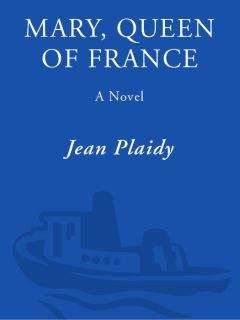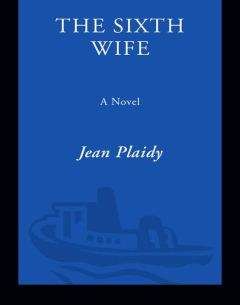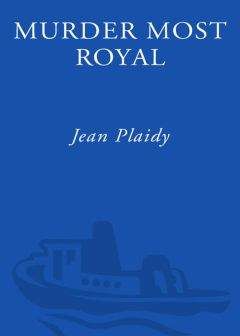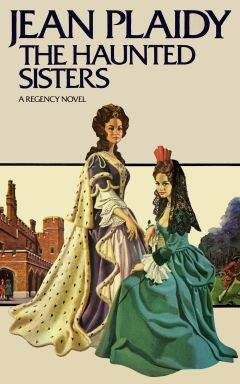Jean Plaidy - To Hold the Crown: The Story of King Henry VII and Elizabeth of York
He could not take his army with him. They would never get away, so he selected sixty of his men and together they left Taunton. But even sixty horsemen found the going difficult. People came out in alarm to watch them, and there was not enough food in the inns for sixty.
Perkin said: “This will never do. We shall be captured at once if we go about in such numbers.”
He selected three men from the sixty and said to them: “When night falls, we will steal away. It will be easy for four of us to make our escape. It is impossible with sixty.”
So the four of them slipped away in the darkness and in due course they arrived at Beaulieu in Hampshire where they found an empty house and there took refuge.
What Perkin wanted to do was lie low until the hue and cry had died down, then make his way back to St. Michael’s Mount, get a ship and take Katharine and the baby, where . . . ? Perhaps they could go to Flanders. Perhaps he could find John and Katharine Warbeck, those parents whom he had denied. Then perhaps they could all live happily together again.
He wanted no crown. He just wanted to live in peace with Katharine.
He lay on the floor, his companions beside him.
Perhaps he should leave them . . . slip away. He could disguise himself as a pedlar . . . work his way back to the Mount. He and Katharine could hide themselves away until they found a ship to Flanders. . . .
Not yet. It was unsafe as yet. He must be careful to preserve his life because Katharine needed him.
Somewhere in the darkness he heard a sound. He raised himself.
Was it the sound of distant horses’ hooves? Perhaps. Some traveler out late.
He lay down and thought of Katharine. Yes, he would find his way back to her. They must hide themselves and plan to get away.
She would agree. Her wish was the same as his—that they should be together.
Again that sound . . . nearer now . . . Perhaps . . . He looked at his sleeping companions. Should he rouse them? No. It was only a traveler in the night.
And then . . . the noise was nearer. Not one horseman but many. He stood up. His companions were awake now. They went to a window.
“We are surrounded,” said Perkin.
There was nothing to do but to surrender. Perkin and his companions were taken back to Taunton by the King’s guards, and for the first time Perkin came face-to-face with the man whose right to the throne he had challenged, the Tudor himself. So Henry had thought the matter of sufficient importance to see his captive in person.
At first Perkin thought: Why, he is an old man! He seemed so to Perkin. Old and gray. He was in truth forty years of age but looked ten years older. Slight with graying hair, light blue-gray eyes and a pale complexion. But there was a certain strength about him and it was impossible to be in his presence without being aware of it.
Perkin was overawed by the pale, ageing man. If he had shown anger he would have been less afraid of him. It was the calmness of the Tudor which unnerved him, the almost blank expression which nevertheless suggested that it was merely a mask to hide his thoughts, which he was determined to keep to himself.
“You are Perkin Warbeck,” said the King.
Perkin started to say: “I am King Richard the Fourth. . . .I was taken from the Tower. . . .”
“Nonsense,” said Henry Tudor. “I know who you are. You are Perkin Warbeck, son of John Warbeck, customs man of Tournay in Flanders.”
Perkin drew himself up to his full height. He must remember what he had learned from Lady Frampton and the Duchess of Burgundy . . . from Lord Desmond. He wished that he could forget that house in Flanders, but somehow with this stern cold-faced man looking at him so penetratingly as though he could read his thoughts he found it difficult.
Henry said: “I have sent for your wife, Perkin. We knew she was at St. Michael’s Mount.”
“No . . . I beg of you . . . Donot harm her. She is not to blame.”
“We know that. She has been deceived as others have. Do not disturb yourself. I am not a monster. I do not harm innocent women.”
Perkin was immensely relieved. Henry was observant. He cares for her more than for his aspirations, he thought. A sentimental fellow. He will not be difficult to handle.
“Now, Perkin,” he said. “You have caused us a great deal of trouble, but I know you are just the tool of certain men . . . enemies of my country. I know you are a foolish young man from a humble family in Flanders and have been used by these people. I am not a cruel man. I have a reputation for being lenient . . . a lover of justice. I do not blame you so much as those who have used you. I shall not harm your wife. I know she is a highly born lady. I shall have her sent to my Queen where she will be accorded the honor due to her rank.”
Perkin put his hands to his face. He was weeping with relief.
“Oh I thank you, my lord, I thank you with all my heart. She has done no harm. She believed . . . with the rest . . .”
Henry smiled. It was going to be very easy to get a confession from this boy. He was glad. He hated the clumsy work of torturers, and the information they got was always suspect.
“So,” he went on gently, “you can rest assured your wife and child will be well treated. Now as for you . . . well, you have offended us greatly. This nonsense about your identity. You know full well who you are and it is not Richard of York. That’s so. Is it not?”
Perkin was silent.
“Oh come. Do not be foolish anymore. I tell you your wife is safe. You must be grateful for that. Are you?”
Perkin nodded dumbly.
“I understand. I have heard of your devotion. You see, I hear a great deal about you, Perkin. There was another like you who set himself up: Lambert Simnel. He has worked well in my kitchens. I have just promoted him to become one of my falconers. He is a good servant . . . very grateful to his King for having spared his life. Poor simple boy. He knows he deserved to lose it . . . as you do, Perkin, as you do. But I do not propose to put you in my kitchens. All I ask you to do is to make a full confession. If you do this, I shall spare your life. I have sent for your wife. You must confess in her presence. And if you do that I shall send you to the Tower of London where you will be my prisoner for a while, but I have no doubt that if you behave with propriety . . . well, I am not a vindictive man and it might well be that in due course . . . you could join your wife . . . if she still wants to be the wife of a Flemish adventurer after she thought she had a royal Duke of York.”
Perkin could not speak. He had not imagined it would be like this at all.
Henry rose. “I will give you a little while to think. And when your wife arrives you shall make your first confession . . . to her.”
Perkin was taken to Exeter where Henry had gone and it wasn’t long before he was summoned to the King’s presence.
As soon as he entered the chamber he saw Katharine.
He gave a cry of joy and would have rushed to her but he was restrained by guards. Eagerly he studied her. She was not harmed in any way. She looked at him in a bewildered fashion as though she was seeing him afresh. He could not bear that.
“Katharine . . .” his lips formed the words and she smiled at him.
“Husband . . .” she whispered, and he knew that she loved him still.
The King said. “Give the Lady Katharine Gordon a chair, and place it here beside me.”
This was done and Katharine sat down.
“Now, my lady,” said Henry, “your husband wants to tell you who in truth he is. He will explain everything. I thought it right that you should know and hear it from his own lips. Proceed, Perkin.”
He tried to speak but he could only look at her. He wanted her to run to him; he wanted to put his arms about her; but she only sat there looking at him with those beautiful appealing eyes begging him to speak.
He had to tell the truth and it all came back so vividly now.
“My father is John Warbeck. We lived in Tournay. He was a controller of customs.”
She stared at him disbelievingly. He should never have lied to her. He should have explained everything before they married. But at that time he had for long periods believed it was true that he was Richard Duke of York. That story of being with his brother in the Tower, of being handed over to the man who could not murder him had seemed far more real than his father’s house in Tournay.
But he must go on. He must preserve his life. He must try to make Katharine understand. He could not bear to see her look at him like that.
He went on: “I was put into several houses. I served there in various capacities . . . in exchange I was given some education. Then the Framptons came to Flanders. They had been supporters of the House of York and they had to leave when King Henry came. They saw my resemblance to the Duke of York and they convinced me that I was one of the Princes who disappeared in the Tower. I passed from one household to another. . . .I went to the French Court and the Court of Bordeaux. . . .I was learning all the time. . . .You know the rest. I passed myself off as Richard Duke of York, second son of Edward the Fourth . . . and therefore since Edward the Fifth was dead, heir to the throne.”
The King was watching Katharine closely during this confession. He said: “You see, my lady, how you have been deceived like so many others.”
Still she was silent, looking at Perkin with disbelief in her eyes.
“My lady, you shall go to the Queen. I have asked her to care for you and treat you as a sister. You will understand I cannot free your husband. I shall not treat him harshly for I see full well that he has been the tool of others. Now he will go to London and you shall go to the Queen. I will leave you for ten minutes to take your farewells of each other and to say what you wish to.”
With those words Henry rose and walked slowly out of the chamber.
Perkin rushed to Katharine. He knelt at her feet and buried his face in her skirts. For a few seconds she did nothing; then he felt her fingers in his hair and he lifted his face to hers.
“Is it true?” she asked. “Is it something they have made you say under threat?”
He shook his head. “It is true . . . alas. Lady Katharine Gordon has married the son of a customs official.”
“I married you,” she said.
He had risen and taken her into his arms and they clung together for a moment.
“Oh . . . my love . . . what will they do to you?” she asked.
Joy flooded over him. In that moment he did not care. All that mattered was that she cared.
“They say the King is lenient. . . .”
She thought of the stories she had heard of Flammock and Michael Joseph. What had they done? Not nearly so much as her husband. He had raised a revolt, headed an army, called himself the true king.
“He will send me to the Tower,” he said. “But he has hinted that in time I might be free.” He took her face in his hands. He said: “Katharine, I don’t think I wanted to go on with it . . . after I found you. But if I had never started it I should never have met you. Marriage between us would have been an impossibility . . . but once I had you . . . and the baby . . . I just wanted to go back . . . back into obscurity . . . to Tournay . . . in a little house . . .”
She said: “I know.”
“And what will you do?”
“It has been decided for me. I must go to the Queen.”
“Katharine . . . in time . . .”
She said: “Let us pray it will be soon.”
“Oh God bless you. You are even more wonderful than I ever thought you could be.”
“I did not love a crown,” she said. “I loved you.”
“And you still do?”
“I do not change,” she told him. “I think perhaps I knew. . . .I could never see you as King of England and myself as Queen. . . .I shall pray that the King frees you. . . .”
“And then, Katharine?”
“We shall go away . . . right away . . . where no one knows us.”
“You will want that?”
“There will be the two of us . . . the three of us . . . Perhaps more children. We will make a home for ourselves . . . and over that will hang no shadows . . . no fears of going to war . . . no crowns, which have to be won.”
“Oh Katharine . . . it’s strange but I feel happier than I have for a long time.”
The guards had come. It was time for Perkin to go to London and for the Lady Katharine to be taken to the Queen.
Henry was not quite as lenient as he had first implied he would be. He did not feel vindictive toward Perkin, but he wanted everyone to know the extent of his folly.
Therefore Perkin must ride through the streets of London that the citizens might come out of their houses to look at the man who had tried to be their king. Some of them threw mud at him. He was crestfallen and humiliated.
“King Richard,” they called after him derisively.
After that he was lodged in the Tower.
Several weeks passed and one day a man in the green and white livery of the King’s household came to him and told him he was free to leave his prison providing that he went immediately to the King’s Court where he would remain for a while under surveillance.
His spirits rose. He was on the way to freedom. He was sure that after a while he would be able to go to Katharine.
He came to Court. The King watched him with amusement and so did others. “The man who would be king!” they said. Well, they had to admit that he had a certain grace, his manners and speech were impeccable. He had clearly had some very good tutors.
Desperately he tried to get news of Katharine. She was with the Queen whose health was not of the best, which meant that she spent a great deal of time away from the King’s Court. She had given birth to a daughter the previous year. Little Mary was a strong and healthy baby; but the following year Edmund had been born and by all accounts he was sickly. The Queen’s health was a matter of concern to the King and he allowed her to live in a certain obscurity provided she showed herself from time to time to let the people know that their royal marriage was a felicitous one. They had two daughters and a son Henry who were all pictures of health and enough to delight the hearts of any parents. If Arthur and Edmund were not as healthy as they might be, that was sad, but as their nurses said, they would grow out of it. There had been the death of little Elizabeth but Henry felt secure in his family. Therefore he was pleased with his Queen and as long as she continued to add to their brood she could live as she wished.
This made it impossible for Perkin to see Katharine unless he left the King’s Court or she came to it from the Queen’s. But although the Queen treated her as a sister, she was still her attendant and it was obvious that Henry did not want the husband and wife to meet. It may have been that he feared they might plot, or people seeing the handsome pair together might think they would well grace a throne.
However they did not meet and there came a time when Perkin could endure this state of affairs no longer.
He was going to see Katharine, no matter what the consequences.




